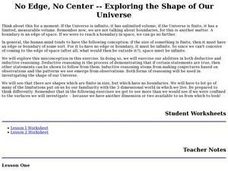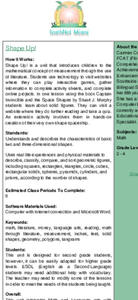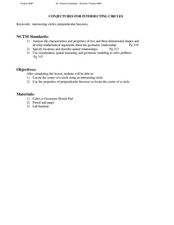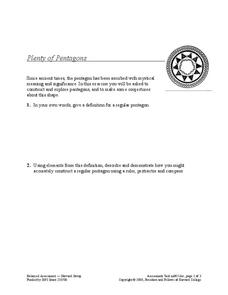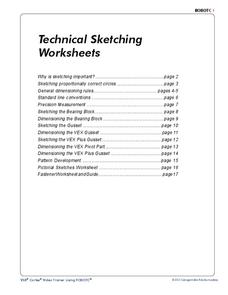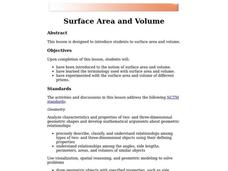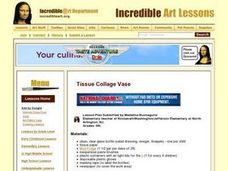Curated OER
Finding Polygons in Cubist Art
Fourth graders explore geometric properties and relationships in a two-dimensional work of art. They first search for and identify polygons in a Cubist painting and then use polygons to create their own Cubist portrait of a classmate.
Curated OER
No Edge, No Center -- Exploring the Shape of Our Universe
Students examine various "spaces" (including ones that are one-dimensional, two-dimensional, and three-dimensional). For each space, they will examine what it means to have or not have an edge, or to be finite or infinite.
Curated OER
Dimensional Flower Garden
Students relate the colors in a garden to those in a rainbow by creating a multicolored three-dimensional garden portrait. They read, "Planting a Rainbow" by Lois Ehlert, then construct their garden with colored paper on white cardstock.
Curated OER
Color in 3-D: A Nature Design Project
Students view a film about Hans Hofman and consider his use of color and layering. They experiment with the concept of 'push and pull' by using warm and cool color schemes in a tracing of leaves and shapes. Students view their work using...
Curated OER
What a SHAPEly Fit!
Students identify and explore the attributes of polygons. They design and create a quilt square using polygons, and produce a class quilt.
Curated OER
Shape Up!
Students investigate measurement through the use of literature through this series of lessons.
Curated OER
Conjectures of Intersecting Circles
Students make conjectures of intersecting circles. In this geometry lesson plan, students observe circles and their position in space. They investigate and observe two and three dimensional objects.
Curated OER
Geometric Solids
Fourth graders examine the properties of geometric solids. Given geometric figures, they brainstorm observations. In groups, 4th graders identify solids and discuss the physical properties. Each student creates a Venn diagram and...
Curated OER
Classifying Solids
In this geometry worksheet, students write the name of the shape, and identify the number of vertices, edges, and faces for 6 e-dimensional shapes. Students draw 3 shapes, and classify groups of pictures.
Alabama Learning Exchange
Twisted Tangrams
Primary geometers create a picture using tangrams. In this geometry instructional activity, students read Grandfather Tang: A Tale Told with Tangrams, cut out their own tangrams, and choose a character from the story to make using their...
Curated OER
Tetrominoes Cover-Up
Third graders are given square tiles and participate in a demonstration on how to arrange them. Using the tiles, they work with a partner to discover how many two-dimensional tetrominoes they can create. To end the lesson, they must...
Curated OER
Comedia dell' Arte Paper Masks
Students create masks from the Italian Renaisance theatre and use them in one-act plays they write. they analyze the role and development of theatre in world cultures.
Balanced Assessment
Plenty of Pentagons
Why are only four colors needed to color webs from regular pentagons, not five? An assessment task requires young mathematicians to first construct regular pentagons using a compass and straightedge, then has them consider a shape formed...
Carnegie Mellon University
Technical Sketching Worksheets
How do you create a technical drawing? Cover the basics of technical sketching with a few practice sketches of simple shapes. A technical sketching lesson introduces the proper precision measurement techniques. Pupils progress to draw...
Curated OER
Discovering Conic Sections in the Motion of Heavenly Bodies
Math scholars study conics and how they are used today. In this mathematical lesson, pupils construct and slice cones after viewing a demonstration.
Curated OER
More Prisms/Nets
Young scholars calculate the volume and surface are of three-dimensional shapes. In this geometry lesson, students use the nets to prove their calculations of shapes. They identify the different parts of a solid using the nets.
Curated OER
Surface Area and Volume
Students are introduced to the notion of surface area and volume. Students review surface area and volume by finding the area of a two-dimensional shape. They practice using the computer to create different surface area shapes.
Curated OER
Spaces and Places
Pupils identify three-dimensional forms in various buildings and construct three-dimensional paper forms.
Curated OER
Exploring the Properties of Rectangular Prisms.
Students define properties of rectangular prisms. In this geometry lesson, students identify the relationship between two and three dimensional objects. They use Cabri technology to graph their figures.
Curated OER
Comparative Sculpture Lesson Plan
Fifth graders view original artwork, define the art form sculpture, discuss similarities and differences between the examples provided, discuss the three-dimensional quality of each example given, and create and critique their own artwork.
Curated OER
Platonic Solids
Young scholars identify different types of polygons. In this geometry lesson, students differentiate between convex and regular shapes. they identify the names of two and three-dimensional objects.
Curated OER
Compass Designs
Students investigate the properties of two and three dimensional objects. In this geometry lesson, students differentiate polygons based on similarity and congruence. They make observation and interpret the data.
Curated OER
Tissue Collage Vase
Fifth graders create a collage vase with tissue paper. Using the vase, they cover the material with tissue overlapping with other pieces. They use Mod Podge to get the wrinkled look of the tissue paper and make three dimensional...
Curated OER
Dinosaur Designs
Students study dinosaurs in science and conduct online research to gather written information about his or her dinosaur. Then, in art class, they sketch their dinosaur and create an accurate three-dimensional dinosaur model out of paper...



